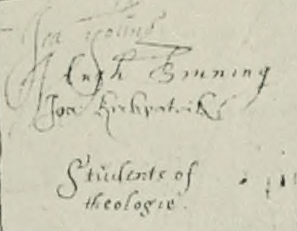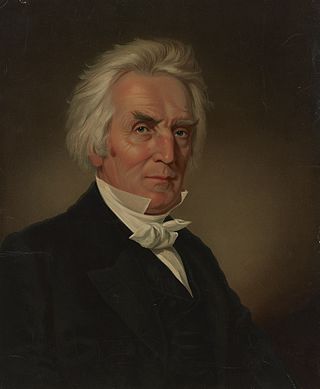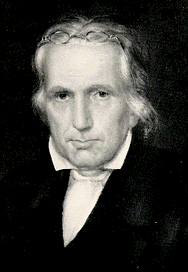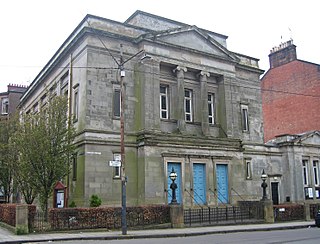External links
- Cambuslang Baptist Church centenary history page
- Haven Green Baptist Church, Ealing (no historical/biographical info shown at this site)
John MacBeath, a Scottish preacher, was minister of Cambuslang Baptist Church from 1909 to 1921 or 1922. He was later minister of Haven Green Baptist Church, Ealing, from 1942 to 1949. His first wife Margaret died during this pastorate, on 16 November 1947. He then remarried to Eleanor Millard. He himself died 3 May 1967 aged 87 years. His funeral took place from Haven Green Baptist Church, of which he was Pastor Emeritus. His younger brother, Andrew MacBeath, formerly Principal of the Bible Training Institute, Glasgow, took part.
Source: COPAC

Hugh Binning (1627–1653) was a Scottish philosopher and theologian. He was born in Scotland during the reign of Charles I and was ordained in the (Presbyterian) Church of Scotland. He died in 1653, during the time of Oliver Cromwell and the Commonwealth of England.

Alexander Campbell was an Ulster-Scots immigrant who became an ordained minister in the United States and joined his father Thomas Campbell as a leader of a reform effort that is historically known as the Restoration Movement, and by some as the "Stone-Campbell Movement." It resulted in the development of non-denominational Christian churches, which stressed reliance on scripture and few essentials.

Cambuslang is a town on the south-eastern outskirts of Greater Glasgow, Scotland. With approximately 30,000 residents, it is the 27th largest town in Scotland by population, although, never having had a town hall, it may also be considered the largest village in Scotland. It is within the local authority area of South Lanarkshire and directly borders the town of Rutherglen to the west. Historically, it was a large civil parish incorporating the nearby hamlets of Newton, Flemington, Westburn and Halfway.
Andrew G. W. MacBeath, a Scottish preacher associated with the Keswick Convention, was younger brother of John MacBeath; studied at the University of Edinburgh, the Baptist College in Glasgow, and New College, Edinburgh.

Thomas Campbell was a Presbyterian minister who became prominent during the Second Great Awakening of the United States. Born in County Down, he began a religious reform movement on the American frontier. He was joined in the work by his son, Alexander. Their movement, known as the "Disciples of Christ", merged in 1832 with the similar movement led by Barton W. Stone to form what is now described as the American Restoration Movement.

John Erskine (1721–1803), the Scottish theologian, was born near Dunfermline at Carnock on 2 June 1721. His father was the great Scottish jurist John Erskine of Carnock and his grandfather was Colonel John Erskine of Cardross who had been in William of Orange's army when it invaded England in the Glorious Revolution of 1688.
The History of Cambuslang is explained to a great deal by its geography. Now in South Lanarkshire, the town of Cambuslang is an ancient part of Scotland where Iron Age remains loom over 21st century housing developments. It has been very prosperous over time, depending first upon its agricultural land, then the mineral resources under its soil.

The Cambuslang Work was a period of extraordinary religious activity, in Cambuslang, Scotland. The event peaked in August 1742 when a crowd of some 30,000 gathered in the 'preaching braes' – a natural amphitheatre next to the Kirk at Cambuslang – to hear the great preacher George Whitefield call them to repentance and conversion to Christ. It was intimately connected with the similar remarkable revivalist events taking place throughout Great Britain and its American Colonies in New England, where it is known as The First Great Awakening.
William M'Culloch was Minister of Cambuslang during the extraordinary events of the Cambuslang Work (1742) when 30,000 people gathered in the hillsides near his church for preaching and communion. Many were there struck by their own depravity and horrified at the probable punishment after death. Trembling, wailing, great pain, nose-bleeding and other strange behaviour was followed in some cases by striking conversions when they suddenly felt accepted by Christ. This gave rise to great rejoicing and singing. It was later calculated that about 400 people had been converted, though many had backslided. The Reverend M’Culloch was a strange person to be at the centre of this phenomenon — one that was being repeated in the American Colonies at the time. He was a poor preacher and claimed never to have experienced the strong feelings of sin or conversion that so many others had reported.
George Baillie Duncan was a prominent evangelical Anglican and Church of Scotland minister, and Keswick Convention speaker.
John Howison was Minister in the Parish of Cambuslang during a turbulent time in Scotland’s history. He was imprisoned several times for his campaign for a Presbyterian, as opposed to Episcopal structure for the Church of Scotland.. He also often reprimanded the King James VI for taking the advice of evil counsellors. He quarrelled with his own parishioners and was convicted of publishing a doctored version of an Act of Parliament, but he died peacefully in Cambuslang, apparently resigned to accepting Bishops in the Kirk.
Patrick Hamilton was a minister of The Church of Scotland during a turbulent period in Scotland’s history. He seems to have chosen the wrong side in the dispute between King Charles I and the Scottish Covenanters. He was also a poet, writing in a straightforward English style, expressing his religious and political beliefs, and longing for a period of peace.
Robert Fleming the elder was a Scottish Presbyterian Minister. Following the Restoration of King Charles II, he declined to accept the authority of the newly imposed bishops in the Kirk. He was therefore ejected as minister at Cambuslang. For the next ten years he remained in Scotland, preaching as he had opportunity. In 1669 he published the first part of Fulfilling of the Scripture in Rotterdam; it was later expanded to 3 parts and it is for this work and other treatises that Fleming is chiefly remembered. On 3 September 1672 he declined indulgence at Kilwinning, disobeyed a citation of the Privy Council, and fled to London, where his Scottish speech somewhat marred his usefulness. On 30 December 1677 he was admitted colleague to John Hog, minister of the Scots Kirk, Rotterdam. After the Revolution he might have been restored to Cambuslang, but preferred to remain in Holland. While on a visit to London, he died of fever, 25 July 1694, after a short illness. Daniel Burgess preached at his funeral and also recorded some memoirs of Fleming's life.

David Brown was a son of bookseller who was twice Provost of the city. He was a Free Church of Scotland minister who served as Moderator of the General Assembly 1885/86. He was co-author of the Jamieson-Fausset-Brown Commentary on the whole Bible.
David Patrick Thomson was a minister of the Church of Scotland who followed a vocation in Christian evangelism as a student, a parish minister, a director of Residential Centres, and as a Christian author and publisher.
The Tell Scotland Movement (1953-1966) was the most extensive and ambitious attempt at outreach by the Protestant Churches in Scotland in the twentieth century. At the time, together with its associated All-Scotland Crusade, led by Dr Billy Graham, it generated considerable energies, publicity and controversy. In 1964 Tell Scotland became a founding part of the Scottish Churches Council, within the ecumenical movement. Commentators since have had varied views about the extents to which Tell Scotland succeeded or failed.

Hillhead Baptist Church is a Baptist church in the west end of Glasgow, Scotland. It is affiliated with the Baptist Union of Scotland. It has operated for over 125 years, one of 164 active Baptist churches in Scotland in the early twenty-first century.
James MacKnight (1721-1800) was a Scottish minister and theological author, serving at the Old Kirk of Edinburgh. He is remembered for his book Harmony of the Gospels and as Moderator of the General Assembly of the Church of Scotland in 1769.

Reverend Robert Guy Ramsay (1895–1976) was a twentieth-century Scottish Baptist minister and author, most closely associated with Hillhead Baptist Church, Glasgow, Scotland. Rev Guy Ramsay was President of the Baptist Union of Scotland during the late 1940s.

Hugh Mackail, Scottish martyr, was born about 1640 at Liberton, near Edinburgh. His father was Matthew Mackail who was minister at Bothwell before being deprived of his ministry by the government in 1662. At an early age he went to reside with an uncle, Hugh Mackail, one of the ministers of Edinburgh. He entered the University of Edinburgh, studying divinity, where he distinguished himself, graduating, as the records show, in 1658 under Thomas Crawford. Shortly afterward he became chaplain and tutor in the family of Sir James Stuart of Coltness and Goodtrees, then Lord Provost of Edinburgh. In 1661, being then in his twenty-first year, he was licensed by the Presbytery of Edinburgh and afterward preached several times with much success. A sermon which he delivered in the High Church, Edinburgh, in September 1662, in which he declared that "the church of Scotland had been persecuted by an Ahab on the throne, a Haman in the state, and a Judas in the church," gave such offence that a party of horse was sent to apprehend him. He escaped, however, and, after lying concealed in his father's house in Bothwell for some time, retired into Holland, where he improved his time by studying for several years perhaps near Rotterdam. Then, returning to Scotland, he lived chiefly at his father's house, until in November 1666 he joined a rising of the covenanters. After nine days' marching, however, his weak health obliged him to leave the insurgents, and on his way back to Liberton he was arrested, carried to Edinburgh, and committed to the Tolbooth. He was several times brought before the council and tortured with the boot. Finally, after trial, despite the efforts of his cousin, Matthew Mackail, an apothecary, who interceded with James Sharp, archbishop of St. Andrews, on his behalf, Hugh was hanged at the market-cross of Edinburgh on 22 December 1666, amid "such a lamentation," says Kirkton, "as was never known in Scotland before, not one dry cheek upon all the street, or in all the numberless windows in the market-place." According to MS. Jac. V. 7. 22, in the Advocates' Library, "immediately after the execution of the aforementioned four men there came a letter from the king, discharging the executing of more; but the Bishop of St. Andrews kept it up till Mr. Hew was executed," Mackail behaved with great fortitude on the scaffold, addressing the crowd with singular impressiveness. He was buried in Greyfriars churchyard. Wodrow describes him as "universally beloved, singularly pious, and of very considerable learning."